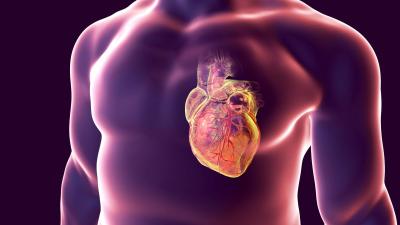Heart Disease
Boost Heart Health With a Plant-Based Diet
Groundbreaking research shows that a plant-based diet doesn’t just prevent heart disease but that it can manage and sometimes even reverse it.
Plants Protect Your Heart
According to the World Health Organization, cardiovascular disease is the leading cause of death in the United States and around the world.1 Eating habits and other lifestyle factors play a key role in determining the risk of heart disease.
Pioneering studies by Dean Ornish, MD, Caldwell Esselstyn Jr., MD, and others have shown that a low-fat, plant-based diet, combined with regular exercise and a healthy overall lifestyle, can prevent, delay, and even reverse heart disease and other cardiovascular events.
Dr. Ornish’s landmark study tested the effects of a plant-based diet on participants with moderate to severe heart disease.2 There were no surgeries or stents—just simple diet and lifestyle changes. Within weeks, 90% of chest pain diminished. After just one month, blood flow to the heart improved. After a year, even severely blocked arteries had reopened. At the Cleveland Clinic, Dr. Esselstyn tested the same approach on patients with severe heart disease and published similar results, finding that the degree of stenosis (or narrowing of the arteries) was reduced, resulting in improved blood flow to the heart.3 Thirty years later, all the compliant patients are still thriving.4
Plant-based diets benefit heart health because they contain no dietary cholesterol, very little saturated fat, and abundant fiber. Meat, cheese, and eggs, on the other hand, are packed with cholesterol and saturated fat, which cause plaque buildup in the arteries, eventually leading to heart disease. Let’s be clear—the quality of the plant-based diet you are consuming makes a difference when it comes to heart disease. There is a lower risk of cardiovascular disease when individuals consume whole, unprocessed plant foods, compared with those consuming unhealthy plant-based foods, including fried foods, higher fat and saturated fat food, and other processed foods.5
Multiple studies support how healthful plant-based diets are associated with improvements in cardiovascular mortality, lower rates of ischemic heart disease, and improvements in cholesterol compared with a diet that contains meat.6-9 It is important to continue to work closely with your health care provider to monitor your health and manage medications, even as you make dietary changes.
A plant-based diet can also help improve several risk factors for heart disease:
- High Blood Pressure: A plant-based diet, rich in potassium, improves blood pressure.10 Learn more about the effects of plant-based diets on blood pressure.
- High Cholesterol: Aim for high-fiber foods, which can help lower cholesterol.11 Learn more about lowering cholesterol with a plant-based diet.
- Inflammation: Plant-based diets help reduce inflammation, that can lead to heart disease and other conditions.12 Listen to the Exam Room Podcast episode on preventing inflammation and illness.
- Excess weight: Being overweight or obese is an important risk factor for heart disease. Learn more about how to lose weight with a plant-based diet.
Meat Can Break Your Heart
Abundant research shows that consuming meat, especially processed and red meat, increases the risk for dying from heart disease.13,14
Eating foods high in saturated fat, such as meat, raises LDL “bad” cholesterol levels, which increases heart disease risk, and research shows that both red and white meat raise cholesterol levels equally.15,16
The saturated fat in meat isn’t the only factor that increases heart disease risk. A study found that as meat is digested in the intestinal tract, gut microbes produce a compound called trimethylamine (TMA) that gets converted into trimethylamine oxide (TMAO) in the liver, which increases the risk for heart disease and heart attacks. Participants in the Cardiovascular Health Study who were eating at least one serving of meat every day had a 22% higher risk of heart disease.17
Iron in meat is also linked to heart disease. A meta-analysis found that heme iron, found in meat, increased risk of heart disease by 57%. Conversely, non-heme iron found in vegetables showed no relationship to risk or mortality from heart disease.18
Plant-Powered Prescription
- Replace meat with beans, tofu, tempeh, or lentils to improve heart health.
- Aim for at least two servings of fruit and three servings of vegetables daily.
- Keep your saturated fat intake as low as possible by avoiding animal products, ultra-processed foods, and tropical oils, such as coconut oil and palm oil.
If you change your diet, and do it very vigorously, you have enormous power. You can reverse heart disease. You can prevent it.
Neal Barnard, MD, FACC, President, Physicians Committee
7 Most Asked Heart Health Questions Answered
Further Reading
DID YOU KNOW?
Plant-based diets can reduce heart disease risk by 40 percent.
References
- World Health Organization. Cardiovascular Diseases (CVDs). Updated June 11, 2021. Accessed July 2, 2024. https://www.who.int/news-room/fact-sheets/detail/cardiovascular-diseases-(cvds)
- Ornish D, Scherwitz LW, Billings JH, et al. Intensive lifestyle changes for reversal of coronary heart disease [published correction appears in JAMA 1999;281(15):1380]. JAMA. 1998;280(23):2001-2007. doi:10.1001/jama.280.23.2001
- Esselstyn CB Jr, Gendy G, Doyle J, Golubic M, Roizen MF. A way to reverse CAD? J Fam Pract. 2014;63(7):356-364b.
- Esselstyn CB Jr. Resolving the coronary artery disease epidemic through plant-based nutrition. Prev Cardiol. 2001;4(4):171-177. doi:10.1111/j.1520-037x.2001.00538.x
- Wang D, Li Y, Ho YL, et al. Plant-based diet and the risk of cardiovascular disease and mortality: the million veteran program. Curr Dev Nutr. 2020;4(Suppl 2):1502. doi:10.1093/cdn/nzaa061_130
- Tong TYN, Appleby PN, Bradbury KE, et al. Risks of ischaemic heart disease and stroke in meat eaters, fish eaters, and vegetarians over 18 years of follow-up: results from the prospective EPIC-Oxford study. BMJ. 2019;366:l4897. doi:10.1136/bmj.l4897
- Orlich MJ, Fraser GE. Vegetarian diets in the Adventist Health Study 2: a review of initial published findings. Am J Clin Nutr. 2014;100(1):353S-358S. doi:10.3945/ajcn.113.071233
- Davey GK, Spencer EA, Appleby PN, Allen NE, Knox KH, Key TJ. EPIC-Oxford: lifestyle characteristics and nutrient intakes in a cohort of 33 883 meat-eaters and 31 546 non meat-eaters in the UK. Public Health Nutr. 2003;6(3):259-269. doi:10.1079/PHN2002430
- Wright N, Wilson L, Smith M, Duncan B, McHugh P. The BROAD study: a randomised controlled trial using a whole food plant-based diet in the community for obesity, ischaemic heart disease or diabetes. Nutr Diabetes. 2017;7(3):e256. doi:10.1038/nutd.2017.3
- Appleby PN, Davey GK, Key TJ. Hypertension and blood pressure among meat eaters, fish eaters, vegetarians and vegans in EPIC-Oxford. Public Health Nutr. 2002;5(5):645-654. doi:10.1079/PHN2002332
- Wang F, Zheng J, Yang B, Jiang J, Fu Y, Li D. Effects of Vegetarian diets on blood lipids: a systematic review and meta-analysis of randomized controlled trials. J Am Heart Assoc. 2015;4(10):e002408. doi:10.1161/JAHA.115.002408
- Fernandez DM, Rahman AH, Fernandez NF, et al. Single-cell immune landscape of human atherosclerotic plaques. Nat Med. 2019. doi:10.1038/s41591-019-0590-4
- Zhong VW, Van Horn L, Greenlandy P, et al. Associations of processed meat, unprocessed red meat, poultry, or fish intake with incident cardiovascular disease and all-cause mortality. JAMA Intern Med. 2020;180(4):503-512. doi:10.1001/jamainternmed.2019.6969
- Alshahrani SM, Fraser GE, Sabaté J, et al. Red and processed meat and mortality in a low meat intake population. Nutrients. 2019;11(3):622. doi:10.3390/nu1103062
- Zong G, Li Y, Wanders AJ, et al. Intake of individual saturated fatty acids and risk of coronary heart disease in US men and women: two prospective longitudinal cohort studies. BMJ. 2016;355:i5796. doi:10.1136/bmj.i5796
- Bergeron N, Chiu S, Williams PT, King SM, Krauss RM. Effects of red meat, white meat, and nonmeat protein sources on atherogenic lipoprotein measures in the context of low compared with high saturated fat intake: a randomized controlled trial. Am J Clin Nutr. 2019;110(1):24-33. doi:10.1093/ajcn/nqz035. Erratum in: Am J Clin Nutr. 2019;110(3):783. doi:10.1093/ajcn/nqz143
- Wang M, Wang Z, Lee Y, et al. Dietary meat, trimethylamine n-oxide-related metabolites, and incident cardiovascular disease among older adults: the Cardiovascular Health Study. Arterioscler Thromb Vasc Biol. 2022;42(9):e273-e288. doi:10.1161/ATVBAHA.121.316533
- Hunnicutt J, He K, Xun P. Dietary iron intake and body iron stores are associated with risk of coronary heart disease in a meta-analysis of prospective cohort studies. J Nutr. 2014;144(3):359-366. doi:10.3945/jn.113.185124










